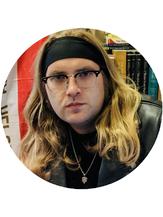by D.W. White
October 8, 2021
D.W. White is a graduate of the M.F.A. Creative Writing program at Otis College in Los Angeles and is at work on his first novel. He was a Fellow at Stony Brook University's BookEnds program for the 2020-2021 year. He serves as Fiction Editor for West Trade Review, has fiction and reviews published or upcoming in Tulane Review, Trouvaille Review, and The Rupture, and contributes regularly to the Chicago Review of Books. A Chicago ex-pat, he has lived in Long Beach, California for seven years, where he frequents the beach to hide from writer’s block.
I Love You But I've Chosen Darkness by Claire Vaye Watkins; Riverhead Books; 304 pages; $27.00
Most good workshops and creative writing courses stress the importance of physical place in fiction. It is a fairly simple concept to grasp, and an easy one to comment upon: the setting is vivid, tangible, real, or that a work needs a stronger sense of location. It’s an element of fiction with which a reader can quickly identify, and indeed books are often classified, formally or otherwise, by where they come from and the locations they explore. Like everything in workshopping, this is both true and overemphasized, but it is nonetheless fairly uncommon to encounter a novel that builds itself on a foundation of physical place — from title to plot, ethos to jacket design — as completely and effectively as Claire Vaye Watkins’ I Love You But I’ve Chosen Darkness. Explored by a first-person narrator who holds nothing back and displays a deep, personal knowledge of the unfiltered desert terrain, the setting and the heroine who inhabits it combine in a strong novel.
Watkins hails from the beautiful, dangerous expanse of Mojave lying between Vegas and the sea, and anyone who's been through the yawning desert that rises from the vast nothing east of L.A. will feel the potent force in I Love You But I've Chosen Darkness. Beginning with the narrator’s family roots in the region, and accounts of the narrator’s childhood growing up in various Mojave towns, the novel can be fitted with passable snugness into the rising trend of ‘auto-fiction,’ but to over-label here is to overlook and overthink. Instead, it can firmly be said that Watkins crafts a narrative that follows a general path her own life would recognize, like fresh water sloughed down a settled riverbed, resulting in a comfortable, intimate first-person that moves from fictive past to fictive present smoothly and confidently. After establishing our protagonist and her situation at the outset—balancing postpartum depression and a vibrant writing career—Watkins allows her narrator an extended detour through her past, coloring her backstory not in tedious exposition but in full color, her family history painted and hoisted up as an illustrative backdrop. From there, the central action resumes.
Our protagonist is a young mother, successful writer, exorciser of familial demons. After a clever opening chapter that examines her answers on a post-natal depression scale, and the scenic route through her family’s backstory, the novel follows her as she attends a speaking engagement, leaving her husband and infant behind. While there, she reconnects with her collegiate group, reflecting on the opportunities that life offers only to the young, at a time when her own seems to have compressed. Indeed it is her raging against the structures and strictures of acceptable, contemporary life — a conflict begun, as the reader is vividly shown, in the novel’s early move to the fictive past with her parents and during her childhood — where Watkins’ narrator is at her most forthright and compelling. Normalcy is presented as a concept at once overwhelming and insufficient, allowing the book to reach its heights of social critique and cultural commentary.
“But what did I care that it was normal? My team of mental health professionals in particular didn’t seem to understand that I wasn’t comforted by being normal, that I took normal as an insult, that knowing these troubles were widely felt didn’t ease them, only meant that on top if my avoidance and guilt and shame and numbness I now felt boring, a kind of death. Knowing all this was normal put me somewhere on the scale of pathetic to suicidal. I thought, If this is normal, count me out.”
This is the candid, direct address that Watkins’ confessional first-person does well, and which makes I Love You But I've Chosen Darkness an important work in our society’s ongoing evolution with regards to mental health, one sure to resonate with many readers.
Bold and brave in its tackling of pertinent, important, yet often unspoken topics, the book is aided in these efforts by Watkins’ point of view, a discursive first-person grounded in her own life. And while the novel will appeal to many with the bold sincerity this approach allows, with the true-to-life dark humor providing verisimilitude and sympathy, Watkins’ strengths are also, at times, her weakness. The irrelevance and dry wit don’t always come off, creating some moments of awkward tonal shifts, while the immediacy and intimacy generated by her autofictive lens comes with the occasional price of a meandering, unfocused narrative detour. While this unspooling of a mind and its thoughts is obviously at the core of Watkins’ story and its depiction of her heroine’s reality, it is an element that perhaps might have been more sharply drawn.
For the intermittent challenges to narrative progression that the point of view presents, however, its unflinching honesty is where it shines. Watkins does not shy away from the realities of parenting and postpartum depression: “Motherhood had cracked me in half. My self as a mother and my self as not were two different people, distinct. The woman they admired, who’d written the books they liked or at least had heard of, if only today, was on the other side of the canyon.” Much like the earlier-quoted passage, here we see Watkins at her best, blending her lived experience with clean, straightforward prose. With her omnipresent, palpable sense of place proving a consistently rich background and her operative point of view providing the vehicle, I Love You But I've Chosen Darkness is an admirable account of what it means to be both artist and mother, individual and caregiver, parent and child, in present day America.
©2021 West Trade Review
__________________________________________________________________________________________________________________________________________________________________________
__________________________________________________________________________________________________________________________________________________________________________
__________________________________________________________________________________________________________________________________________________________________________
__________________________________________________________________________________________________________________________________________________________________________
__________________________________________________________________________________________________________________________________________________________________________
An Honest Portrait: Place and Perspective in Claire Vaye Watkins’ I Love You But I’ve Chosen Darkness
FICTION REVIEW
Image by Andreas Selter on Unsplash
Stay Connected to Our Literary Community. Subscribe to Our Newsletter




